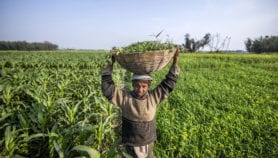By: Katie Mantell
Send to a friend
The details you provide on this page will not be used to send unsolicited email, and will not be sold to a 3rd party. See privacy policy.
Genetically modified (GM) crops show great promise for the developing world — including for small-scale farmers — but their merits should be carefully assessed on a case-by-case basis, according to two reports released today.
The Use of Genetically Modified Crops in Developing Countries, a draft report by the Nuffield Council on Bioethics, states that “GM crops can, in some circumstances, have considerable potential to increase yields of crops, thereby improving agricultural practice and the livelihood of poor people in developing countries.”
It calls on governments and regional bodies such as the European Commission to fund a major expansion of GM-related research relevant to the needs of small-scale farmers in developing countries.
The second, separate report, an overview of 50 science-based reviews commissioned by the International Council for Science (ICSU), agrees that GM crops “offer promise to contribute more toward both food security and poverty reduction”.
“We’re certainly not claiming that GM crops will feed the world,” says Sandy Thomas, director of the Nuffield Council. “But GM crops could make a difference to the livelihood of small-scale farmers in appropriate cases.”
The draft Nuffield report accuses the European Union (EU) of “severely challenging” the freedom of choice of farmers in developing countries by insisting on strict requirements for labelling and traceability of GM crops. As a result, decision makers in developing countries are concerned that even planting GM crops for domestic use might jeopardise their export market to Europe.
Both reports agree that scientific evidence shows that current GM foods are safe to eat. But, according to the draft Nuffield report, some non-governmental organisations from developed countries are exaggerating the risks of GM crops.
“There is a form of ‘ventriloquising’ within the developing world about the risks of GM crops, [with views] that actually come from the developed world,” says Michael Lipton from the University of Sussex, United Kingdom, and a member of the working group that drew up the report.
Both reports underline the importance of publicly funded agricultural research. The ICSU report, New Genetics, Food and Agriculture: Scientific Discoveries — Societal Dilemmas, says that “publicly funded research that addresses key gaps in present knowledge would be valuable to inform the debate about the use of modern genetics”.
“Most research [on GM crops] addresses the needs of industrialised countries and most of the research is conducted by industry,” says Thomas
The Nuffield Council is inviting views on the draft version of the report, and particularly welcomes comments from those in developing countries. Comments should be sent to Harald Schmidt at [email protected] by 8 August 2003. The final report will be published in October 2003.
Link to draft Nuffield Council report The Use of Genetically Modified Crops in Developing CountriesLink to ICSU report New Genetics, Food and Agriculture: Scientific Discoveries – Societal Dilemmas
© SciDev.Net 2003













